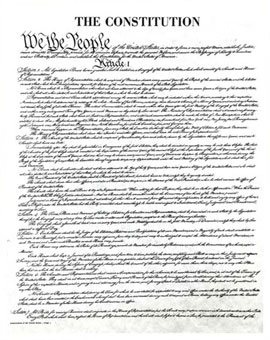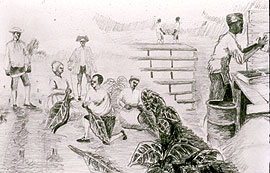We, The People

"of the United States, in Order to form a more perfect Union, establish Justice, insure domestic Tranquility, provide for the common defense, promote the general Welfare, and secure the Blessings of Liberty to ourselves and our Posterity, do ordain and establish this Constitution for the United States of America."
Thomas Jefferson wrote his last public letter on June 24, 1826, in response to an invitation from the mayor of Washington to attend a celebration in honor of the fiftieth anniversary of the Declaration of Independence. His farewell to the nation, Jefferson's letter represents a supreme example of his vision of the American Revolution and its message of hope. Americans were the first people to throw off the shackles of oppression, but in time other peoples would also "assume the blessings and security of self-government." It is an eloquent expression of Jefferson's belief that the people are fullly capable of governing themselves.
However, the celebrated phrase "all Men are created equal" did not imply the Founding Fathers believed all Americans should have equal rights. Women did not enjoy the same political or civil rights as men, the vast majority of African Americans remained enslaved, and most Native Americans were considered separate peoples outside the bonds of citizenship.
Neither was the Declaration of Independence intended to formally guarantee individual or collective rights-that was left initially to the states and their constitutions. Only when the Bill of Rights was incorporated into the Federal Constitution of 1789 as the first ten amendments were citizens able to appeal to a common body of constitutional law. But even though the Declaration did not create the grounds for a free and equal society at the nation's birth, it has served to inspire those excluded from their rights ever since, in this country and around the world. The language of equality expressed in the Declaration became the universal credo of freedom.

Multiple Occupations. A.N. Lewis, 1973
In 1865, the Thirteenth Amendment to the Constitution ended slavery in the United States. In 1920, women won the right to vote. Native Americans were offered citizenship in 1889 if they separated from their tribes and assimilated into mainstream society. Later, in recognition of their service in World War I, the Citizenship Act of 1924 offered Native Americans citizenship without loss of tribal property and the right to vote in federal elections. (The right to vote in state elections was decided by individual states.)
In this country and around the world, the language of equality expressed in the Declaration has become the universal credo of freedom.
- September 11-14
1786 -
Annapolis Convention
The Annapolis Convention calls for a Constitutional Convention
Read More - February 21
1787 -
Constitutional Convention
Congress calls a Constitutional Convention
- May 25
1787 -
Convention Begins
The Convention begins with seven states represented
Read More - May 29
1787 -
The Virginia Plan
The Virginia Plan is introduced by Gov. Edmund Randolph
Read More - June 15
1787 -
The New Jersey Plan
The New Jersey Plan is introduced by William Paterson
Read More - September 15
1787 -
Draft Constitution
A Draft Constitution is approved by unanimous vote of the states represented at the Convention
- September 17
1787 -
The Constitution
The Constitution is signed and the Convention adjourns.
- September 26-28
1787 -
Ratification of the Constitution
Congress debates the proposed Constitution and transmits it to the states for ratification
Read More - April 30
1789 -
George Washington becomes President
George Washington is inaugurated President in New York City.
- June 8
1789 -
The Bill of Rights
James Madison introduces amendments that will become the Bill of Rights
Read More - 1865
-
The 13th Amendment
Read More - 1920
-
The 19th Amendment
Read More - 1924
-
The Citizenship Act of 1924
Read More - 1962
-
Native Americans can vote in state elections in New Mexico